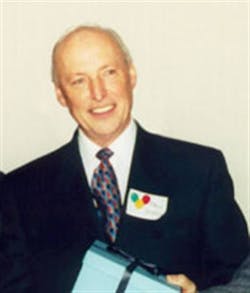At 17, Paul Hyatt was a part-time apprentice with Superior Tire Corp. in Toronto. At 68, he will take over as president of the Tire Industry Association in Las Vegas.
In between, the soft-spoken Canadian has kept larger retailers at arm's length while growing his business. As owner and president of Superior Tire, he oversees seven stores in the greater Toronto area and one northwest of Toronto in Barrie, Ontario. Six of the outlets are franchise operations.
"You can't survive this long without having a really clear idea of what you stand for and what you're willing to do for your customers," he says. "But you also have to know when to adapt to changes around you."
He also has worked closely with dealers north of our border. He is a past president of the Tire Dealer Association of Canada, and represented independent tire dealers on the Ministry of the Environment's Task Force for Scrap Tire Management.
The transition to leading an organization in the United States should be an easy one, according to Hyatt. "Other than operating costs and geographical and demographic differences, Canadian and U.S. dealers essentially face the same challenges: the ever growing number of SKUs, storage problems, consolidations, government regulations, greater difficulties accessing new car information necessary for car repairs, and qualified personnel recruitment."
[PAGEBREAK]
During his one-year term as TIA president, Superior Tire will celebrate its 65th anniversary. Hyatt's ambitious goals (see sidebar) will keep him south of the border much of the year. But not to worry; thanks to "an excellent and dedicated Superior team," Hyatt will have both "the time and energy to fulfill my role with TIA."
What kind of president will he be? Only time will tell. However, he may have given us a glimpse into his temperament and psyche in a letter he sent to The Toronto Star recently.
Columnist John Mahler, in response to a reader who took him to task for casting aspersions on the tire industry, called for the industry to set up "a self-policing policy and enforcement group" to weed out the dealers mistreating customers. There are too many "crooks," he wrote.
Hyatt countered with a response of his own, excerpts of which follow. (He sent the "Dear John" letter to Mahler in May; it has yet to appear in the newspaper or on its Web site.)
"In your reference to 'crooks in the tire retail business,' I agree with the previous writer, who stated that this existed in every business whether it be computers, medical doctors, car dealers, carpet retailers, salespeople, etc. Unfortunately, there is a lack of training, accountability, ignorance and, in some cases, a lack of integrity in all industries and professions.
"I also agree that the system of tire distribution by wholesalers 'creates the opportunities for these fly-by-night operations,' as you so eloquently wrote. But surely there should be some onus on the consumer to research the quality of the vendor and the product.
"Too often, a purchase is made with no further thought than to the perceived cheap price and with no further interest in safety, surety, performance and even whether the tire is installed properly. The savvy consumer soon learns to avoid such vendors and realize that the price is soon forgotten when performance outperforms the price.
"With 64 years of business excellence behind us, we (at Superior Tire) certainly have made good customers out of these many savvy customers with investment in great training programs and ensuring staff integrity.
[PAGEBREAK]
"In reference to your comments about tire retailers' need to set trade standards and self-policing activities with some type of enforcement, let me update you on some very positive things that are happening in the tire industry throughout North America and the international community.
"The Tire Industry Association (TIA), an international association representing all segments of the tire industry, has a history that spans more than 80 years. They have completed a number of world-class, outstanding training programs which include safety manuals, automotive tire service, commercial tire service, tire pressure monitoring systems, tire wear conditions manuals, staff training and shop operations, to name a few. Any tire dealer can obtain these affordable programs and take advantage of 'best practices' and up-to-date training in all aspects of our tire industry.
"Those dealers that have taken advantage of these professional programs are the ones that the savvy consumer will get to recognize by the quality of the store, their staff training and their product knowledge. Those shops are also the few who can adequately service 'run-flat' tire systems and have some idea of the complexities of the tire pressure monitoring systems now in use in most new cars.
"Yes, there are many professional tire dealers who are far better trained and are far more capable of taking care of the modern day tires and the tire pressure monitoring systems than some of the car dealers themselves. And in many cases, it is to this well-trained tire dealer to whom untrained car dealers and garages will send their cars, customers and their performance wheels.
"On that particular issue, let me address the tire pressure monitoring system (TPMS), which is the tip of the iceberg of the Right to Repair Act currently being advocated by most automotive and consumer associations in North America -- including my company and also the Automotive Industry Association (AIA) in Canada. This Act addresses basically the controlled auto repair by the automobile manufacturers which is being perpetrated on the consumer with ever increasing controls. (See www.controlledautorepair.com.)
"In Canada, we need legislation to protect the consumer. There's no guarantee that the auto companies will make your car's information available, now or in the future, without legislation. And as cars become more and more complex, the need to protect the consumers' choice becomes that much more important. But automakers are increasingly unwilling to share that information with outside repair shops. You may own your vehicle, but the automaker still holds the key to its computer software. If a general repair shop doesn't have access to these computer codes, vehicle schematics or specialized tools, consumers can no longer take their cars to an outside repair facility and their trusted mechanics.
[PAGEBREAK]
"If drivers are caught with TPMS problems or their car breaks down, they may have no choice but to take it to an authorized car dealer, no matter how far away it is.... This could turn into a major inconvenience and perhaps an expensive towing bill. If it's a flat tire, they can get another one at any shop, but they may still have to go to a car dealer, and maybe pay another repair bill, to have the pressure system reset if, in fact, the automaker doesn't share the necessary computer codes.
"There are five to six major manufacturers of OEM valve stem sensors, and each has several different sensors within each manufacturer. I believe there are more than 20 different kinds of sensors at this time while there are at least 50 different recalibration and relearn procedures for all makes and models of new vehicles under 10,000 GVWR. There is no standardization within a vehicle manufacturer nor is there any between manufacturers -- other than the nickel-plated valve core.
"Just to service these systems and wheels takes training, knowledge, spare parts and now three different torque wrenches ranging from 40 in./lbs. to 150 ft./lbs. to change and rotate a tire with a TPMS.
"In this day and age, it surely is up to the consumer, as it always has been, to search out the quality tire dealership. The consumers would do well to heed the old adage of 'buyer beware' and be able to search out the professional tire dealer or professional facility that they wish to deal with rather than accept mediocre service and workmanship. -- Paul Hyatt
International flavor: Canadian Hyatt wants to bring the world to TIA
Paul Hyatt is the first non-U.S. citizen to lead the Tire Industry Association (TIA). That makes the Canadian-born independent tire dealer more qualified than most to advance TIA's ties to the global community.
He feels up to the challenge, and the goals Hyatt wishes to achieve as president focus on just that. He is quick to point out, however, that the foundation set by TIA's board of directors and Executive Vice President Dr. Roy Littlefield will ensure a smooth transition for him.
"With this solid background, I can focus on the needs of not only the domestic members, but also the international dealers from all our member countries," he says. "Our Global Council, with members from more than 65 countries, was established to address the needs and issues of international dealers, who were united under the TIA banner, enabling them to remain competitive and connected in the global marketplace.
[PAGEBREAK]
"This global communication initiative provides the network of over 5,000 TIA members with an important international forum with which to exchange ideas. We will continue this initiative."
There are a number of other areas of concern Hyatt says he wants to address as president.
1. Benefits. "I want to work closely with our manufacturers and state and provincial associations to ensure our programs are beneficial and pro-active for each. Essential training will continue to be predominant in our goals, with expanded courses translated into French and Spanish."
2. Right to Repair Act. "There are also a number of issues that TIA must address with a strenuous voice, and I intend to follow up on them throughout my term. The passage of the Vehicle Owners' Right to Repair Act must be supported in order to ensure that independent auto repair facilities, many of whom are tire dealers, will have affordable access to information needed from the car manufacturers to service all vehicles on behalf of consumers everywhere."
3. Membership. "Attracting new members from our global and regional communities, while developing benefits that complement those offered by regional associations, is essential for TIA's growth."
4. Consumer education. "TIA has also established a new program, called TIRES, or Tire Initiative for Research, Education and Safety. With the approval of the industry, a small fee, which would be passed along to the consumer, would be charged on new and replacement tires sold and used on highway vehicles. This fee would finance consumer education campaigns, industry personnel programs, and research and development. A percentage of the funds would also go to provincial and state associations to support their efforts in these areas.”
Hyatt says TIA will continue to follow its Strategic Plan, but not blindly. The organization is always at the ready to modify the plan "to adapt to the new tire industry environment and allow for variations in business trends or regulations when necessary."




